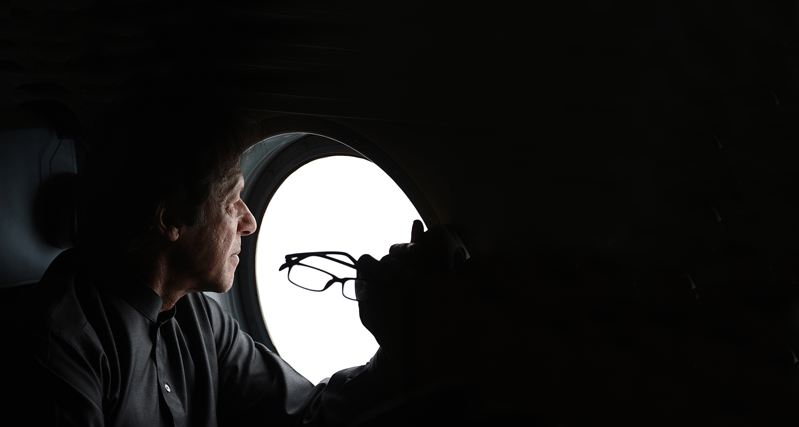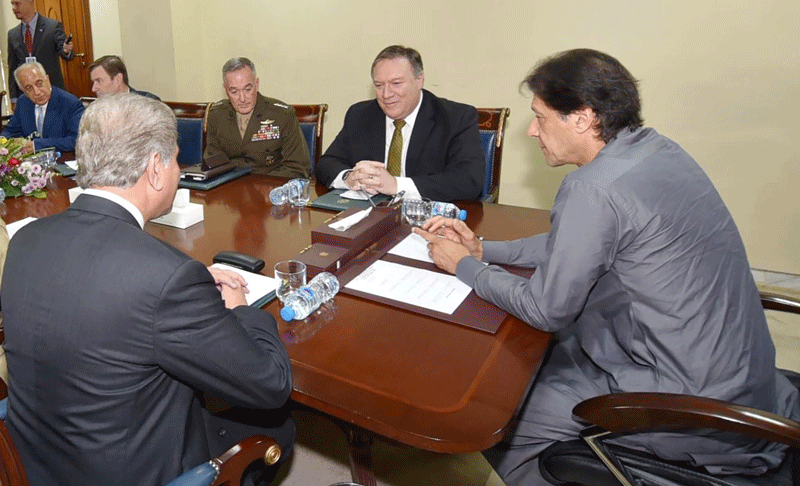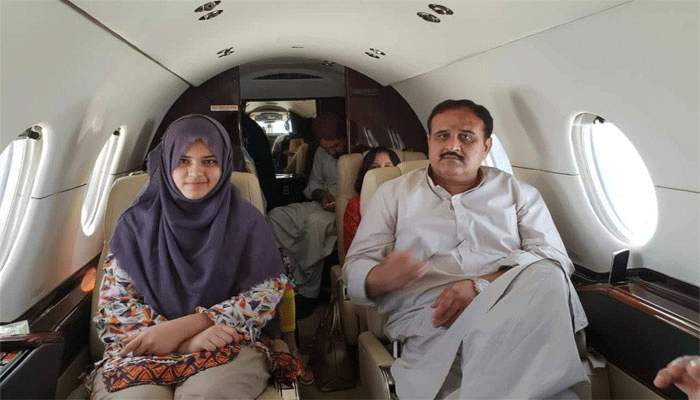Dispensation of Doubt
By Amir Zia | Cover Story | Published 7 years ago

For Prime Minister Imran Khan and his team, the start of their innings in power has proved far from perfect. Soon after winning the general election, the Pakistan Tehreek-e-Insaaf (PTI)-led government got itself embroiled in a series of much-publicised, petty controversies, reinforcing the impression of continuing political instability even in ‘Naya’ Pakistan, and raising questions about the capacity and ability of the new dispensation. Ironically, most of these controversies were self-generated and could easily have been avoided had the new ruling party opted for a disciplined and organised approach after assuming power.
From the ugly and embarrassing incident in Karachi, where a newly-elected PTI MPA, Imran Shah, was caught on camera slapping an elderly citizen, to that of Punjab Information Minister Fayazul Hasan’s unsavoury and misogynistic remarks about two leading stage actresses, all highlight the inexperience and hotheadedness of some of the PTI’s lawmakers.
However, it was not just the young guns who created unnecessary controversies. PTI’s media savvy Information Minister, Fawad Chaudhry, also became the target of criticism and taunts when he went an extra mile to prove that Imran Khan’s back-and-forth helicopter rides from his Banigala residence to the Prime Minister’s House cost just Rs.55 per kilometre. His statement raised a storm, which raged in the media for days – indicating that the PTI May have over-played its ‘austerity, simplicity’ and an end to protocol cards for top government functionaries.
But the real faux pas was made on the diplomatic front. The congratulatory letter sent by Indian Prime Minister, Narendra Modi, to Khan on his electoral victory, was seen by none other than veteran politician Shah Mehmood Qureshi, our new foreign minister, as a message indicating India’s desire for the resumption of talks between Pakistan and India. Later, the Foreign Office had to deny Qureshi’s statement on Modi’s offer for talks.
A bigger diplomatic controversy was stirred up when Pakistan Foreign Office spokesman, Mohammad Faisal, and Foreign Minister Qureshi both described a US State Department’s account of a telephone conversation between US Secretary of State, Mike Pompeo, and Khan as “factually incorrect.”
“There was no mention at all in the conversation about terrorists operating in Pakistan. This should be immediately corrected,” said Faisal. But within days, Pakistan retreated from its position when the United States shared the transcript of the telephone conversation.
All these highly embarrassing incidents took some of the shine off the PTI’s electoral victory and gave its critics an opportunity to carp about the party’s inexperience and lack of preparedness. The heat and noise arising from secondary concerns also shifted the focus of the national discourse from the urgent problems faced by the country.
“How can we expect them to deal with major problems when they cannot understand and interpret simple diplomatic letters and telephone calls,” said Siddique-ul Farooq, a senior leader of the Pakistan Muslim League-Nawaz (PML-N). “They will push the country into a deeper mess.”
The frenzied coverage of PTI’s slips also underscores the fact that governing Pakistan in this day and age of robust, sensational and opinionated media, remains a Herculean task for any government — not least because a long-helpless, hopeless nation finally seems to have awoken to what the state owes its citizens.

US Secretary of State Mike Pompeo (second right) at the Prime Minister’s Office in Islamabad, on September 5, 2018.
Not all Pakistanis are, however, critical. According to Ikram Sehgal – a leading political commentator and defence analyst – the new PTI government is being judged too soon and too harshly. “[It] has not been involved in any mega-corruption scandal. It has not committed any big blunder. These are just the teething problems of a new set- up. The PTI government should be given time before we start making judgments about its performance,” he said.
But in a highly polarised political atmosphere and an unsparing media, granting the government a honeymoon period of even a few months is perhaps too much to ask for. Therefore, the biggest challenge for it – even before it starts dealing with Pakistan’s real challenges – is managing public expectations and keeping itself out of controversies on trivial and non-issues.
The PTI has promised a new Pakistan, but sadly, the focus of its message was lost – at least in the initial days of its rule – in the optics and unnecessary debates about cutting expenditure and auctioning vehicles at the Prime Minister’s House.
Does this mean that the nascent PTI government is already on a downhill trajectory? Many in the opposition and media would want Pakistanis and the rest of the world to believe a future of doom and gloom for the PTI. But while challenges for Pakistan are indeed massive, Khan and his team are likely to stabilise the ship and get a smooth-run compared to their predecessor – the PML-N government.
And there are reasons to be optimistic.
Firstly, Imran Khan – unlike former prime minister Nawaz Sharif – does not carry the baggage of a bitter past with the country’s powerful military establishment. While there was a huge trust gap between the civilian and military leadership under the PML-N government – aggravated by Nawaz Sharif’s desire to arrest and try former military ruler Pervez Musharraf – under Imran Khan, this relationship kicked off with a positive start.
Khan and his key men spent more than eight hours at the GHQ during their first visit. They were briefed about the country’s internal and external security challenges. The new premier was accorded a warm welcome by the top military command and in an unprecedented first, chaired this civil-military huddle. In the past, such meetings were jointly chaired by the army chief and the prime minister. The body language from both sides reflected a sense of ease and trust.
“Since the country’s return to a full-fledged democracy in 2008, every successive military leadership has supported the democratic process and the elected leaders,” said a source in the military who requested anonymity. “This policy continues.”
Additionally, according to observers, there is one major difference between the past and the present: Khan is neither tainted with corruption allegations, nor does he carry the burden of a bad relationship with the army.


Unnecessary controversies: PTI legislator Imran Shah’s misbehaviour with a senior citizen; the Punjab governor and his family’s helicopter ‘joyride.
It is a good omen for Pakistan and its democracy that the civilian and military leadership are on one page and are likely to push in one direction on key security and foreign relations issues. Even in democracies in the developed world, major security and foreign relations decisions are made in consultation with all stakeholders. In Pakistan, however, such matters have remained the exclusive realm of a small coterie, bypassing the cabinet, the Parliament and other state institutions. Such was the state of affairs under the former prime minister.
Civil and military leaders, according to sources, are now committed to institutional decision-making, the rule of law and the Constitution. This will help bring the much-needed political stability that has been missing in the country for the past several years.
The second factor favouring Khan is that the punch and bite of the once united opposition has diminished due to contradictions inherent among the parties. The Pakistan Peoples’ Party’s (PPP) decision to abstain from the election of the prime minister (because its lawmakers did not want to vote for Shehbaz Sharif) and pitch its own candidate for the slot of president, has helped end an atmosphere of political uncertainty.
PPP’s young Chairman, Bilawal Bhutto Zardari, already announced that while his party would keep reminding the PTI leadership of its promises and play the role of an active opposition, it would cooperate with the government in areas where there is convergence of views. This shows that the PPP – the ruling party in Sindh – wants a good working relationship with the federal government.
The PML-N appears confused and fractured from within. While Nawaz Sharif is directing his hardliners to adopt a tough stance against the PTI and the military establishment, the party’s President, Shehbaz Sharif, is sticking to his policy of moderation and non-confrontation. This friction within the PML-N is also a positive sign for the PTI.
But this does not mean that running Pakistan will be easy for the new government. Pakistan’s debt-ridden economy faces a looming balance of payment crisis that requires an injection of vast funds to stabilise the currency, boost foreign exchange reserves and create confidence among the people, especially investors and business personnel.
Faced with an ever deepening economic crunch – courtesy of the mismanagement and flawed policies of the previous government – the new dispensation finds its hands tied and has to turn to either the International Monetary Fund (IMF) for or friendly countries for an injection of badly needed funds. Under these circumstances, keeping Pakistan’s economy afloat will remain difficult, let alone provide relief to the people.
Other pressing challenges, including reviving the loss-making state-run commercial enterprises, reforming the energy sector and dealing with its recurring problem of circular debt, can only be tackled once Pakistan wards off the immediate balance of payment crisis. The US has already indicated that it will not support Islamabad’s bid for a bailout by the IMF. This means that Washington will try to press Pakistan to accept its geo-political agenda in South Asia, which includes curtailing China and establishing Indian hegemony here and to ‘do more’ in the so-called war against terror, in which Islamabad has already done enough. Pakistan will have to perform a high-wire act of protecting its national interests and addressing US concerns.
Tied to this are Pakistan’s relations with India and Afghanistan, which the new government has vowed to improve. This won’t be easy, at least in the near-term, because our eastern neighbour is getting into election mode, while Kabul is under intense pressure from a resurgent Taliban, which is scoring one military victory after another against the rickety government of Ashraf Ghani and his foreign backers. Blaming Pakistan for its battlefield losses makes more sense for Kabul and its allies.
While surrendering to the American demand of dragging Pakistan into the Afghan conflict – the longest and the most expensive US war to date – is damaging for the country, it does not mean that the internal threat of terrorism and extremism no longer exists. In this fight, Pakistan has scored major gains – thanks to the military Operation Zarb-e-Azb and the continuing Operation Radd-ul-Fasaad, but the implementation of the 20-point National Action Plan (NAP) is yet to become a reality. The PTI government is expected to take ownership of the NAP, which the PML-N tried to resist. The NAP includes action against terror-funding, reforms in our police and judicial systems, as well as reform in the country’s seminaries — all of which are in line with the PTI programme, and could, if implemented, help mitigate international concerns about Pakistan.
In order to raise Pakistan’s human development index, the government needs to invest in education, health and the social sector. But given the paucity of funds, it is probable the PTI will find it increasingly difficult to live up to its promises on this front in the immediate future.
Implementing the reform agenda, improving governance, devolving power, delivering justice and eradicating corruption, have all been major themes in the PTI’s long list of promises. With a slim majority in the Parliament on one hand and the demands of his allies on the other, there will be no smooth sailing for Khan.
The government will require a great deal of sagacity, skill and political will to steer Pakistan towards safe waters. Imran Khan’s past record is on his side, but the odds faced by Pakistan and the weight of its traumatic history paint a grim picture of the future. Will Khan be able to defy history and write a new chapter for Pakistan – yet again? His naysayers are convinced he cannot, but Khan’s supporters believe he can and will deliver. He is, they say, is Pakistan’s best and only hope.
Amir Zia is a senior Pakistani journalist, currently working as the Chief Editor of HUM News. He has worked for leading media organisations, including Reuters, AP, Gulf News, The News, Samaa TV and Newsline.


